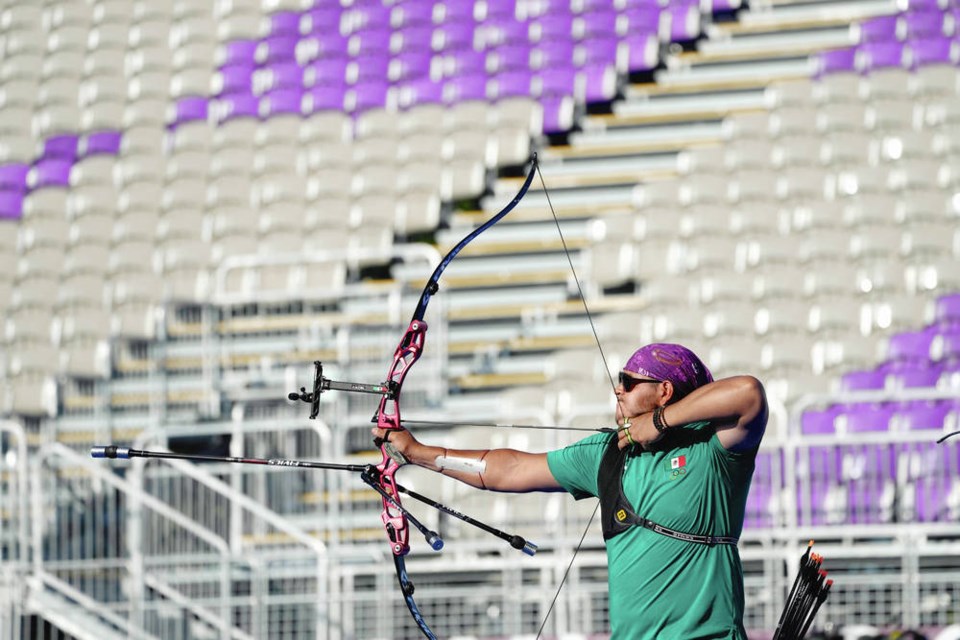It’s 3 a.m. and some lunatic is banging on the wall. I can just about make out her angry, muffled voice, which seems to be yelling something like “Turn off the TV, I can’t sleep.”
“I can’t sleep, either,” I call back. “Bulgaria still has a shot at the bronze in rhythmic pole-vaulting.” Then I turn up the volume to drown out the racket.
Maybe you’re going through the same thing, in which case this wasn’t how you expected to spend your night. You actually said you wouldn’t watch the Olympics this year. You’d had enough of the commercialization, the doping, the money-grubbing IOC’s exploitation of amateur athletes.
Add to that the Tokyo time difference, the eeriness of empty stadiums and the general weirdness of staging the Games during a pandemic, and you were out.
Except then you dragged your butt out of bed at coffee o’clock Friday to watch the opening ceremonies for a few minutes, just to see the Canadian team march in, and then decided to hang in for the qualifying round of the men’s 10-metre air pistol (yes, that’s a real event). Next thing you knew it was the next morning and you were still glued to the screen, yelling at the French-language feed of the synchronized hammer throw, or whatever.
At least, that’s the scenario the CBC and its broadcast partners dream of because, jeez, they have scheduled a total of 3,775 hours of Olympic coverage, so somebody better watch. Really, 3,775 hours. A Times Colonist reader calculated that’s the equivalent of watching all 12 Star Wars films 140 times each. If you recorded every minute of Olympics coverage, binge-watching it non-stop would take 157 days.
Never mind that many of these sports, demanding as they are, normally get less screen time than Kevin Costner in The Big Chill, meaning you don’t have a clue what’s going on when you watch them. (Be honest, the first time you saw Greco-Roman wrestling, you thought it was porn.)
With that in mind, here’s a guide to the games of the Tokyo Olympics.
• Softball. There are so many sports to squeeze into the program (33 competitions, 339 events) that they had to start the tournament Tuesday when Canada’s women beat Mexico. That was a good way to ease into the Games, because softball is the only Olympic sport we have all played, though none of the Olympians A) go barefoot, B) can catch a fly without spilling their beer, or C) once pulled a groin while trying to impress the hottie in centre field.
• Rowing. Casual observers are often confused by the difference between doubles and pairs events. The distinction is simple: Boats in the doubles races contain a pair of rowers, while those in the pairs races have two. Note, though, that while the boats known as quads have four rowers, boats in the fours events have a crew of five.
• Equestrian. Bruce Springsteen’s daughter is competing in the jumping events, though anyone who refers to her as “Bruce Springsteen’s daughter,” as opposed to an accomplished competitor in her own right, will be crucified by the smugly self-righteous on social media. She was born to canter.
• Hurdles. The poor person’s version of horse jumping. No Springsteen family members involved.
• Shooting. The only event in which participants compete while lying down. This isn’t a sport, it’s an armed nap. You know this. I know this. But they have guns, so what can we do?
• Archery. Fifteenth-century shooting.
• Badminton. The most dangerous backyard sport since they banned lawn darts.
• Trampoline. I take that back about badminton.
• Decathlon. The 10 disciplines include 400-metre run, broad jump, javelin, tossing the caber, thumb-wrestling, log-birling, parallel parking, hot dog eating, peer pong, darts.
• Pentathlon. Pretty sure this is the name of a performance-enhancing drug. Either that or it’s part of a family of events (marathon, walkathon, swimathon, telethon, sleepathon) rooted in a Greek verb meaning “to raise money for charity by doing something for a very long time.”
• Swimming. One of our most high-profile athletes is Penny Oleksiak, who won a relay medal Saturday night. She’s one of the few Canadians well-known enough to pick up endorsement money. Even so, her income pales beside that of her hockey-playing brother Jamie, who just signed a $23-million US deal with the Seattle Kraken. Most of our competitors survive by sleeping in the ditches where they pick up pop bottles, which makes us happy because Canadians like their Olympians the way they like their aforementioned charities: impoverished and on the verge of starvation.
Which leads to another point: pandemic or not, they dedicate their lives to the pursuit of their sports, for nothing more than a chance to fly toward the sun, once every four (or in this case, five) years, whether we’re watching or not.
jknox@timescolonist.com



